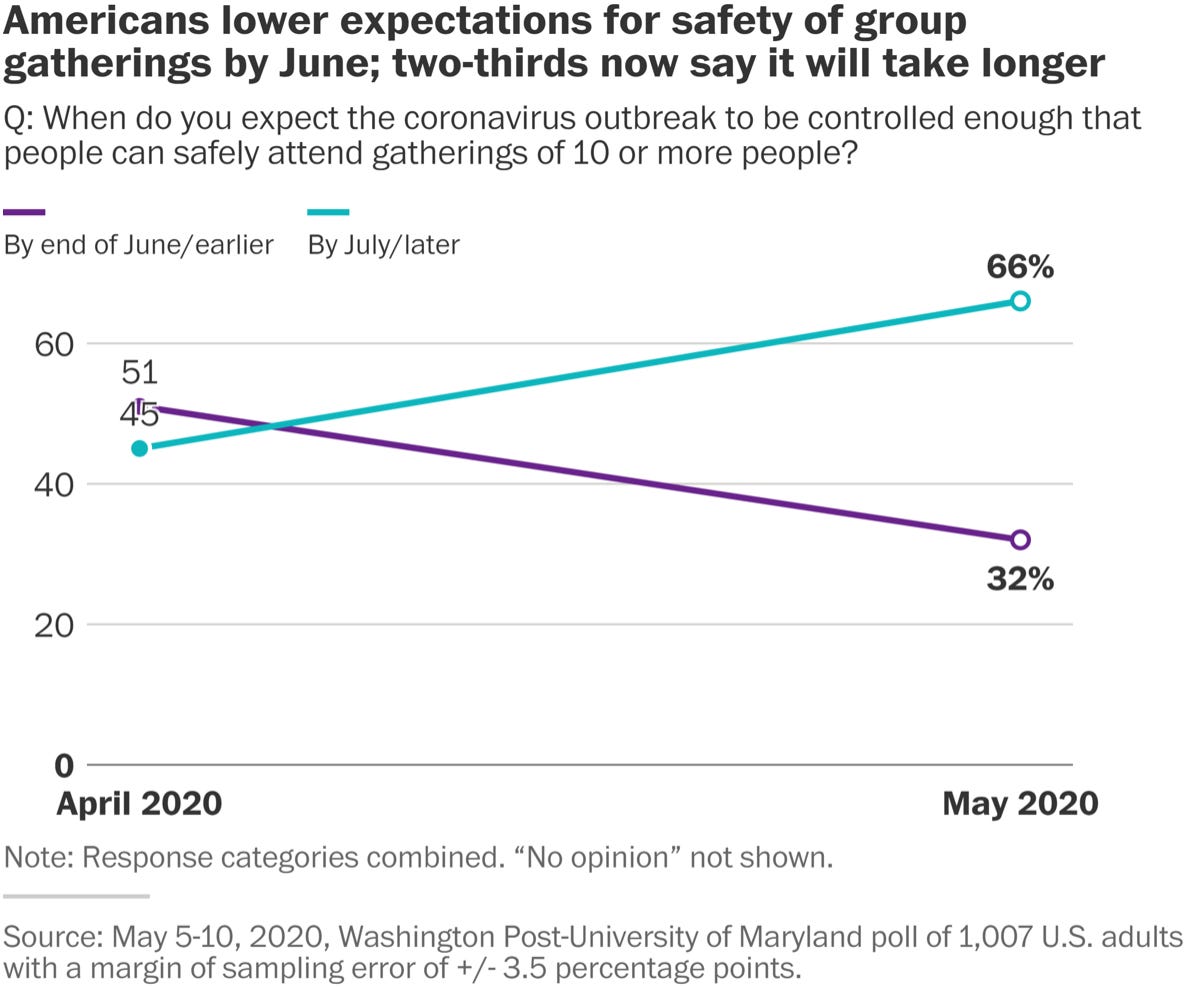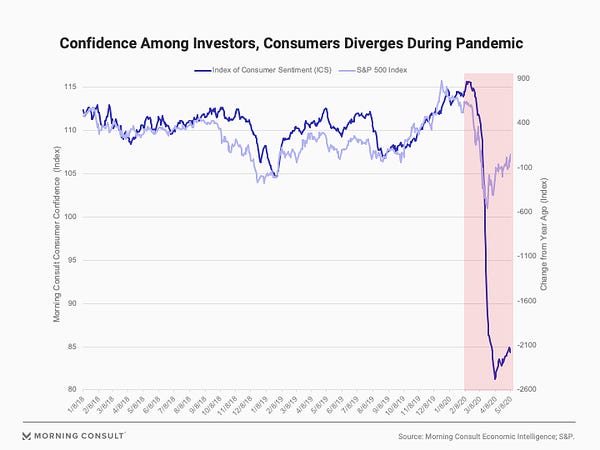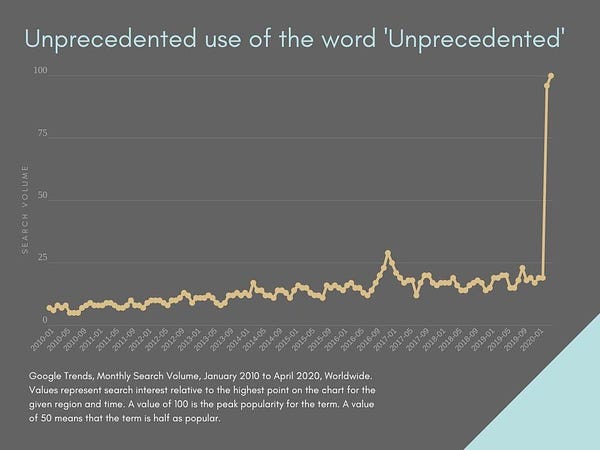Like the newsletter? During this trial period, you get the Founding Member Rate — 50% off the regular cost. Continued thanks to everyone who already has done so!
The World
Federal Reserve Chair Jerome Powell, in a sober review of where the U.S. economy stands, said the country could face an “extended period” of weak growth and stagnant incomes, pledged to use more Fed power as needed, and issued a call for more fiscal spending. (Reuters)
House Democrats unveiled a sprawling coronavirus rescue bill that would direct more than $3 trillion to state and local governments, health systems, and other initiatives, setting up a clash with Senate Republicans and the White House. The bill would send a second round of stimulus checks to millions of Americans. Speaker Nancy Pelosi is pushing for a Friday vote. (Washington Post)
The budget deficit soared to a record $1.935 trillion in the 12 months through April — almost double the $1.037 trillion budget gap for the year through March. Meanwhile, new tax breaks expected to total about $650 billion started flowing to U.S. businesses. (Wall Street Journal, Wall Street Journal)
The global economic outlook has darkened since the IMF forecast last month that it would suffer the worst blow since the 1930s. The fund will next month publish downward revisions to its global economic forecasts. Meanwhile, UK household spending dropped more than 40% in April. (Irish Times, Financial Times)
Americans are curbing their expectations about when it will be safe for gatherings of 10 or more people, with about 2 in 3 adults now saying it will not be until July or later before those events can happen. (Washington Post-University of Maryland poll)

Beijing appears to be stalling international efforts to find the virus source amid an escalating U.S. push to blame China for the pandemic. Meanwhile, China is sealing off cities near North Korea as new clusters grow. (Wall Street Journal, Bloomberg)
China and the European Union are likely to hold their delayed summit early next month, as Beijing seeks to stabilise its turbulent relationship with Brussels amid ongoing tensions with the United States. (South China Morning Post)
Airlines must give passengers refunds for cancelled flights and cannot force them to accept vouchers instead, the European Commission said. (Irish Times)
The Supreme Court considered two sets of cases with potentially historic implications for president power and whether they protect President Trump from state prosecutors and House committees seeking information about his business affairs. There was a strong possibility of a split decision. Go deeper: The Daily with Adam Liptak. (New York Times)
The 23-campus California State University system plans to all but cancel in-person classes in the fall. Meanwhile, colleges expect shortfalls despite rich endowments, and half of college graduates may be headed for unemployment. (Los Angeles Times, NPR, The Hill)
The NFL may anticipate full stadiums, but following a Gov. Gretchen Whitmer radio interview, that appears unlikely for the Detroit Lions and the state’s other professional and college teams. (Detroit Free Press)
Economy
Economists project that more than 100,000 small businesses have shut permanently, according to a study by University of Illinois, Harvard Business School, Harvard University and University of Chicago researchers. Their latest data suggests at least 2 percent of small businesses are gone. (Washington Post)
U.S. venture capital investment activity remains vibrant, but off approximately 25% from pre-pandemic levels. (Axios)
Maersk warns of 25% drop in shipping, as the world's largest container shipping line warned global trade would drop by a record amount this year. (Financial Times)
Main St. vs. Wall St.:


Technology
Twitter will allow employees to work at home forever, while Google and Facebook will allow remote work through the end of 2020. Apple said it plans to reopen offices in phases, starting in late May in major locations. (Buzzfeed, Bloomberg)
Online grocery shopping in the U.S. saw a 110% boost in daily online sales in April, while E-commerce purchases of wine, beer, spirits, and accessories saw a 74% increase. (Adobe)
Big advertisers are seeking to cancel TV commitments — up to 50% of third-quarter spending — testing the industry’s five-decade-old way of doing business. (Wall Street Journal)
Instacart is in talks to raise several hundred million dollars from existing and new investors. The deal would put the company’s pre-money valuation at between $12 billion and $14 billion, at least 50% over Instacart’s valuation during its last financing in late 2018. (The Information)
BP’s vaunted “net zero” targets fall far short of what is required for the company to achieve net zero emissions. (The Times)
Smart Links
Jeff Bezos’s audacious bet to build the first “vaccinated” supply chain. (Marker)
How predictive text systems change what we write. (Harvard SEAS)
How independent bookstores are dealing with the pandemic. (Washington Post)
Be very wary of the R value. (UnHerd)
The pandemic will permanently change the auto industry. (New York Times)
Dogs can detect traces of gasoline down to one billionth of a teaspoon. (Science Daily)
Good News
It’s unprecedented.
Robin Hood raised $115 million during its "Rise Up New York!" telethon hosted by Tina Fey. (CBS News)
Thanks for reading. Did you like the newsletter? Why not subscribe now?




